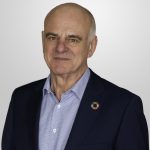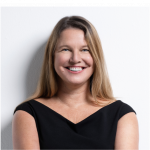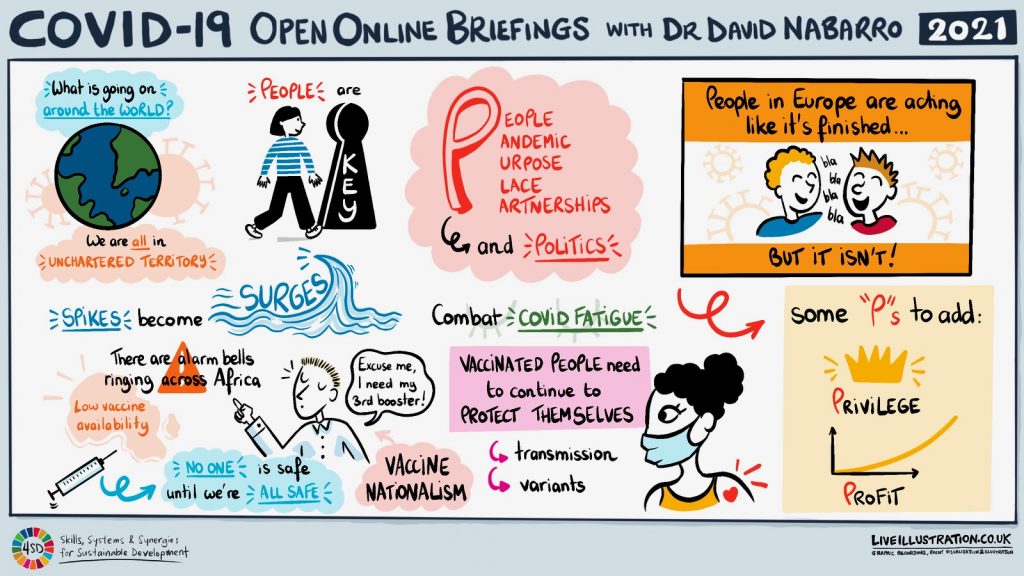The world has had it with lockdowns at just the wrong moment. Covid is spreading faster than ever even as political leaders back off restrictions designed to curb it. Dr. David Nabarro, special envoy of the world health organization on Covid-19, warns that the next six months will be rough. “We are in the middle of a really difficult pandemic and we are nowhere near the end of it,” he said. Vaccines alone cannot stop the pandemic. There is not enough supply and, in any case, the vaccines are better at preventing severe illness than at stopping transmission of the virus. He warns that measures of hospitalization and death miss the serious “Long Covid” afflicting many younger patients. Dr. Nabarro discusses effective public health measures with public health experts in Botswana and Canada.
This episode is sponsored by the Royal Academy of Engineering’s Leaders in Innovation Fellowships. Dr. Jo-Ann Passmore of the University of Capetown Medical School describes her innovation, GIFT, which measures inflammation as a simple test for sexually transmitted diseases.
Featured guests

David Nabarro is the Co-Director of the Imperial College Institute of Global Health Innovation at the Imperial College London and supports systems leadership for sustainable development through his Switzerland based social enterprise 4SD. From March 2020, Mr. Nabarro is appointed Special Envoy of WHO Director General on COVID-19.
In October 2018, he received the World Food Prize together with Lawrence Haddad for their leadership in raising the profile and building coalitions for action for better nutrition across the Sustainable Development Goals.

Magen Mutepfa is an Associate Professor in the Department of Psychology, Faculty of Social Sciences at the University of Botswana. She teaches psychology and public health courses. Previously she was a teaching assistant in the School of Public Health at the University of Sydney (NSW), and was a recipient of Australia International Postgraduate Research Scholarship and Australian Postgraduate Award. Prior to attaining a doctoral degree, she worked as coordinator counsellor at the University of Zimbabwe. She was also employed as a Guidance and Counselling Officer in the Ministry of Education, Sport and Culture in Zimbabwe where she championed advocacy on HIV/AIDs and substance abuse. She is a registered psychologist with more than 10 years of cross-discipline experience in psycho-therapy support services, more than 10 years of teaching experience, and has also worked as a Research Consultant for Pacific Institute of Research and Evaluation (4 years). Her current research is on the Impact of health-related characteristics on Mental Health and Quality of Life (QOL) of older people in Botswana, and Personal and Family Coping with COVID-19 in Global South. She has published more than 42 articles in well-renown journals and books. She is the Botswana Liaison Officer for Pass It On Network, an organization accredited to the United Nations and a member of 4SD. She is also an Editorial Board Member for the Journal of Psychology in Africa and School Psychology Review Journal.
Research and professional interests include human resources for health (global health training and education, short-term medical experiences, public health workforce), the built environment’s effects on chronic disease (food deserts, public transit/active transport, and community development), social media and medicine, and medical education.

Public health physician leader with a strong track record in domestic and global health endeavours carried out at both grassroots and international policy levels. Board certified in Canada (family medicine and public health) and the United States (preventive medicine.) Work experience at all three levels of government in Canada (local/regional, provincial, federal) in two provinces (BC, ON) as well as work internationally.
Research and professional interests include human resources for health (global health training and education, short-term medical experiences, public health workforce), the built environment’s effects on chronic disease (food deserts, public transit/active transport, and community development), social media and medicine, and medical education.

Jo-Ann has a PhD in Immunology from the University of Cape Town in South Africa, where she holds an academic position as Associate Professor and Principle Medical Scientist with the National Health Laboratory Service in Cape Town. Her laboratory at the University of Cape Town has been conducting clinical and translational research related to sexually transmitted infection prevention since 2006 and trained more than 20 PhD and MSc students from Africa.
Since 2014, Jo-Ann in partnership with Lindi Masson (co-developer and previous PhD student then post-doctoral fellow at UCT) developed the Genital InFlammation Test (GIFT) for HIV prevention. GIFT was developed as a social innovation, to improve the reproductive health of women in resource-constrained settings like Africa where access to accurate and affordable testing for common sexually transmitted infections and bacterial vaginosis is severely limited. The GIFT device is a true point of care, low cost, accurate lateral flow test, that measures reproductive tract inflammation biomarkers for sexually transmitted infections or bacterial vaginosis, to improve case finding for these common conditions known to increase HIV risk in women in Africa.
In 2021, representing the GIFT project team, Jo-Ann was selected to participate in the Royal Academy of Engineering’s Leaders in Innovation Fellowship (LIF7) programme, which aims to develop the entrepreneurial capacity of researchers and innovators to commercialise innovations aimed at addressing social and economic challenges. LIF7 is a UK government’s Newton Fund Initiative, involving 14 countries, and co-hosted in South Africa by the Technology Innovation Agency (TIA). As part of LIF7, Jo-Ann and the South African GIFT team were placed second overall in the pitching contest.
See more here: www.passmore-lab.org.za and www.GIFT.org.za
This episode was made possible through the kind support of:


In collaboration with:

